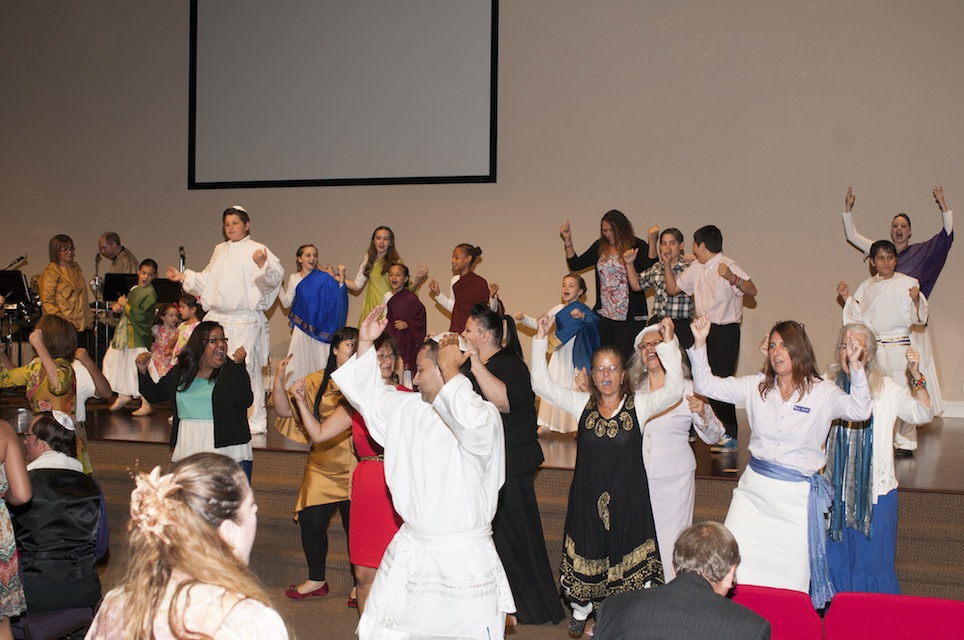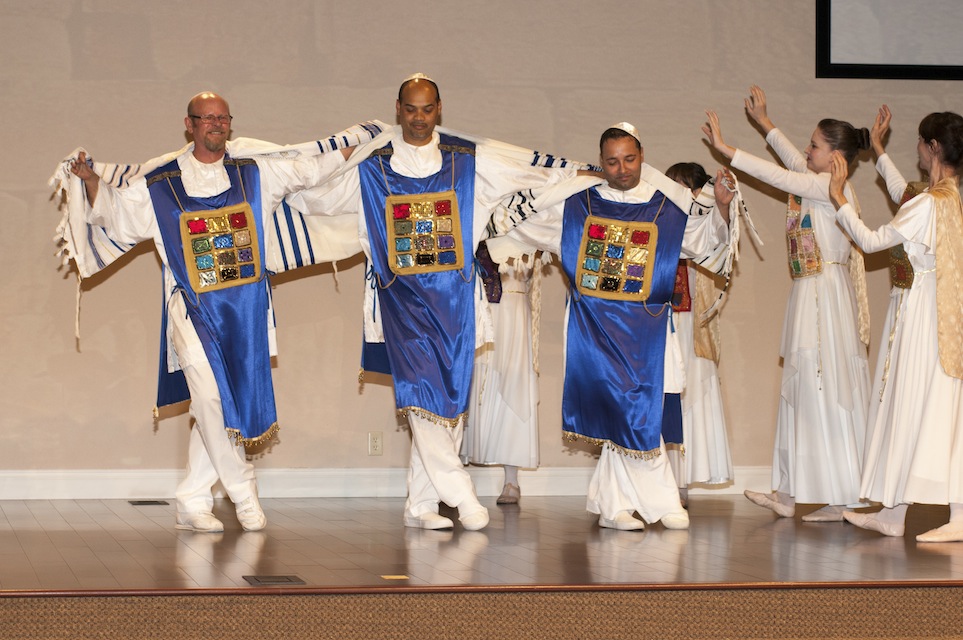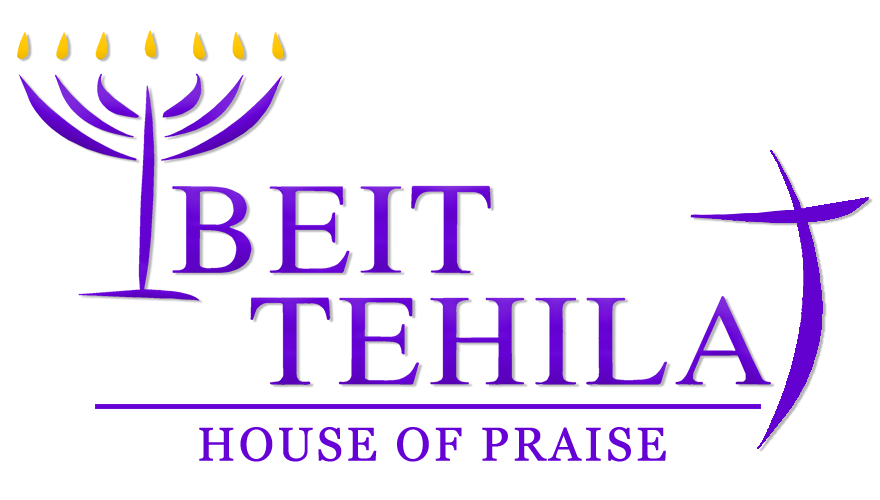
We were created to worship God and to make His praise glorious Psalms 66:1-2 Make a joyful noise unto God, all ye lands: Sing forth and honour of his name: Make his praise glorious.
Whether we are praising Him in an extravagant celebration of joy, a quiet expression of reverence and humility, or out of simple obedience to His voice, our worship is an outward expression of what’s going on in the inward heart of man.
All of our gifts and talents have been given to us by our Creator to glorify Him. If we have been born again and our spirit has been renewed, we will desire to express our love and devotion to the One who created us. If we are not worshiping Him we will end up worshiping creation. Romans 1:25 says, “Who changed the truth of God into a lie, and worshiped and served the creature more than the Creator, who is blessed forever. Amen.” God knew that if we did not set our affection on Him we would set our affection on the things of this world. This world will steal our time away from our Heavenly Father, who deserves all of our worship!
There are more scriptures about praise than there are about worship. Why? God inhabits the praises of His people. “But thou art holy, O thou that inhabitest the praises of Israel,” Psalm 22:3. Our praise is an expression of our excitement, enthusiasm and thankfulness for what God has done for us. It is an outward sign of Him showing Himself glorious through us. 1 Peter 2:9 states, “But ye are a chosen generation, a royal priesthood, and holy nation, a peculiar people; that ye should show forth the praises of him who hath called you out of darkness into his marvelous light.”
God’s people should be the happiest people on earth! Not just in our time of worship and assembly but every day and every minute of our lives. Yes, we will have times of sadness, trial and tribulation, but we won’t stay there very long when we begin to meditate on the things God has done for us. He has delivered us, healed us, set us free from sin and death. We have eternal life through His Son, Yeshua (Salvation)! Imagine: His presence now resides in each and every one who has been born from above, born of the Spirit. Now that should be enough to make us do the “Hebrew Happy Dance!” King David danced and God’s presence was still in the Ark!

King David instructs us in the Book of Psalms how to worship the God of Abraham, Isaac, and Jacob (Israel). As Renewed Covenant believers, we are living in the days of the restoration of the tabernacle of David and the restoration of all things. See Acts 15:16 and Amos 9:11. When King David brought the Ark of the Covenant back to Jerusalem it represented restoration for the Children of Israel. The Ark symbolized God’s presence among His people. Today, His presence resides in our earthly temples. “What! Know ye not that your body is the temple of the Holy Ghost which is in you, which you have of God, and ye are not your own? For ye are bought with a price: therefore glorify God in your body, and in your spirit, which are God’s,” 1 Corinthians 6:19-20. We have been in the restoration process since the time of Messiah. For the last 2,000 years we have been slowly progressing in the truth of God’s word. The greatest amount of restoration can be seen in the last 200 years of church history.
But how do we know if our worship is ordained by God? His word instructs us. Yeshua said we are to worship God in spirit and in truth (John 4:23). Once we have been born of the Spirit, we need to search the Holy Scriptures for instructions on how He wants us to celebrate and worship Him.
We have a lot to praise God about. Each one of us has been gifted in some way to bring glory to His name.
Praise and worship – no act is more central to the Christian life. Praise and worship gives rhythm and structure to our lives; it is the heartbeat of congregational life. Worship is the first act of a new church, and in hard times it’s the last “program” to get cut. However, when worship gets cut from a church, the congregation passes away. Worship is crucial to the life of a believer.
Scripture is our instruction manual on how to worship a holy God! Our best illustration of praise and worship is found during the time of King David. Everything was extravagant! Israel was a united kingdom, living in the Land, free from enemy control, victorious: a united people under God’s government and living in His presence (after the return of the Ark of the Covenant to Jerusalem – See 2 Samuel 6 and 1 Chronicles 15). You will notice in Scripture that every time Israel is being restored as a people they respond with great rejoicing and full of praise (singing, dancing – wedding celebration style). See Jeremiah 31:3-5 and Isaiah 61:4-11.
The whole congregation is called to participate in worship in some form or fashion. It was never meant for a select few. In the last 100 years we have seen some significant restoration taking place in our congregations: some good and some not so good. God has designed a way to worship that is beautiful and all we have to do is follow the pattern. Let’s look at how we can express our love and adoration to a holy God with holiness. Below is a list of scripture references of ways we can worship our Creator. These can be done corporately and personally. Psalm 29:2 instructs us to “Give unto the Lord the glory due unto his name; worship the Lord in the beauty of holiness.”
Singing
Psalm 27:6 “And now shall mine head be lifted up above mine enemies round about me: therefore will I offer in his tabernacle sacrifices of joy; I will sing, yea, I will sing praises unto the Lord.”
Choirs
1 Chronicles 15:27 “And David was clothed with a robe of fine linen, and all the Levites that bare the ark, and the singers, Chenaniah the master of the song with the singers: David also had upon him an ephod of linen.”
- Singers in Hebrew is shiyr (Strongs #H7891); or (the original form) shuwr (1 Samuel 18:6); a primitive root (rather identical with #7788 through the idea of strolling minstrelsy); to sing:–behold (by mistake for 7789), sign (-er, -ing man, -ing woman).
Playing a Variety of Instruments
Psalm 150:3-5 “Praise him with the sound of the trumpet: praise him with the psaltery and harp. Praise him with the timbrel and dance: praise him with stringed instruments and organs. Praise him upon the loud cymbals:praise him upon the high sounding cymbals.”
Clapping Hands
Isaiah 55:12 “For ye shall go out with joy, and be led forth with peace: the mountains and the hills shall break forth before you into singing, and all the trees of the field shall clap their hands.”
- Clap in Hebrew is macha (Strongs #H4222); a primitive root; to rub or strike the hands together (in exultation):–clap.
Lifting of Hands
1 Timothy 2:8 “I will therefore that men pray everywhere, lifting up holy hands, without wrath and doubting.”
Bowing or Prostrating Ourselves
Psalm 99:5 “Exalt ye the Lord our God, and worship at his footstool; for he is holy.”
- Worship in Hebrew is shachah (Strongs #H7812); a primitive root; to depress, that is prostrate (especially reflexively in homage to royalty or God):–bow (self) down, crouch, fall down (flat), humbly beseech, do (make) obeisance, do reverence, make to stoop, worship.
Speaking Praise
Hebrews 13:15 “By him therefore let us offer the sacrifice of praise to God continually, that is, the fruit of our lips, giving thanks to his name.”
Shouting Praise
Joshua 6:5 “And it shall come to pass, that when they make a long blast with the ram’s horn, and when ye hear the sound of the trumpet, all the people shall shout with a great shout; and the wall of the city shall fall down flat, and the people shall ascent up every name straight before him.”
- Shout in Hebrew is ruwa (Strongs #H7321); to mar (especially by breaking); figuratively, to split the ears (with sound), that is, shout (for alarm or joy):–blow an alarm, cry (alarm, aloud, out), destroy, make a joyful noise, smart, shout (for joy), sound an alarm, triumph.
Rejoicing & Celebrating
Psalm 68:3 “But let the righteous be glad; let them rejoice before God: yea, let them exceedingly rejoice.”
- Rejoice in Hebrew is suws (Strongs #H7797); a primitive root; to be bright, that is, cheerful:–be glad, Xgreatly, joy, make mirth, rejoice.
Leviticus 23:41 “And ye shall keep it a feast unto the Lord seven days in the year: it shall be a statute for ever in your generations; ye shall celebrate it in the seventh month.”
- Celebrate in Hebrew is chagag (Strongs #H2287); properly to move in a circle, that is (specifically) to march in a sacred procession, to observe a festival; by implication to be giddy:–celebrate, dance, (keep, hold) a (solemn) feast (holiday), reel to and fro.
Circle Dancing
Jeremiah 31:13 “Then shall the virgin rejoice in the dance, both young men and old together: for I will turn their mourning into joy, and will comfort them, and make them rejoice from their sorrow.”
- Dance in Hebrew is machowl (Strongs #H4234); from #H2342; a (round) dance:– dance (-cing).
Team of Dancers
Exodus 15;20 “And Miriam the prophetess, the sister of Aaron, took a timbrel in her hand; and all the women went out after her with timbrels and with dances.”
- Dances is Hebrew is machowlah (Strongs #H4246); feminine of #H4234; a dance:–company, dances (-cing).
Marches & Processionals (Singers, Instruments, Banners, Dancers)
Psalm 68:24 “They have seen thy goings, O God; even the goings of my God, my King, in the sanctuary.”
- Goings in Hebrew is haliykah (Strongs #H1979); feminine of #H1978; a walking; by implication a procession or march, a caravan:–company, going, walk, way.
Banners & Flags
Isaiah 13:2 “Lift ye up a banner upon the high mountain, exalt the voice unto them, shake the hand, that they may go into the gates of the nobles.”
- Banner in Hebrew is nec (Strongs #H5251); from #H5264; a flag; also a sail; by implication a flagstaff; generally a signal; figuratively a token:–banner, pole, sail, (en-) sign, standard.
Obedience to His Teachings & Instructions
Genesis 26:5 “Because that Abraham obeyed my voice, and kept my charge, my commandments, me statutes, and my laws.
- Obey in Hebrew is shama (Strongs #H8085); a primitive root; to hear intelligently (often with implication of attention, obedience, etc.; causatively to tell, etc.):– X attentively, call (gather) together, X carefully, X certainly, consent, consider, be content, declare, X diligently, discern, give ear, (cause to, let make to) hear (-ken, tell), X indeed, listen, make (a) noise, (be) obedient, obey, perceive, (make a) proclaim (-ation), publish, regard, report, shew (forth), (make a) sound, X surely, tell, understand, whosoever [heareth], witness.
Celebrating His Feast Days
Leviticus 23:1-3 “And the Lord spake unto Moses, saying Speak to the children of Israel, and say unto them, Concerning the feasts of the Lord, which ye shall proclaim to be holy convocations, even these are my feasts. Six days shall work be done; but the seventh day is the sabbath of rest, an holy convocation; ye shall do no work therein: it is the sabbath of the Lord in all your dwellings.”
- Feasts in the Hebrew is mow’ed (Strongs #H4150); from #3259; properly an appointment, that is a fixed time or season; specifically a festival; conventionally a year, by implication, an assembly (as convened for a definite purpose); technically the congregation; by extension, the place of meeting; also a signal (as appointed beforehand):–appointed (sign, time), (place of, solemn) assembly, congregation, (set, solemn) feast, (appointed, due) season, solemn (-ity), synagogue, (set) time (appointed).
Giving of Our Substance to God (Tithes, Offerings & Alms)
Malachi 3:10 “Bring ye all the tithes into the storehouse, that there amy be meat in the mine house, and prove me now herewith, saith the Lord of hosts, if I will not open you the windows of heaven, and pour you out a blessings, that there shall not be room enough to receive it.”
- Tithes in the Hebrew is ma’aser (Srongs #H4643); from #H6240; a tenth; especially a tithe:–tenth (part), tithe (-ing).
Acts 24:16-17 “And herein do I exercise myself, to have always a conscience void of offense toward God, and toward men. Now after many years, I cam to bring alms to my nation, and offerings.
- Alms in the Greek is elehaymosoonay (Strongs #G1654); from 1656; compassionateness, i.e. (as exercised towards the poor) beneficence, or (concretely) a benefaction:–alms (-deeds).
- Offerings in the Greek is prosphora (Strongs #G4376); from #G4374; presentation; concretely, an oblation (bloodless) or sacrifice:–offering (up).
Prayer & Intercession
Isaiah 56:7 “Even them will I bring to my holy mountain, and make them joyful in my house of prayer: their burnt offerings and their sacrifices shall be accepted upon mine altar; for mine house shall be called a house of prayer for all people.”
